MercoPress. South Atlantic News Agency
Tag: Brazilian Federal Police
-
Saturday, February 11th 2017 - 10:52 UTC
Fears police strike and street violence could spread to Rio do Janeiro
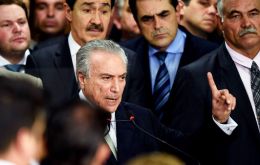
A partial police shutdown over unpaid wages put Rio de Janeiro on edge Friday, sparking fears of chaos similar to that seen in a neighboring Espirito Santo state where police are in revolt and criminals have run amok. Morale among street police is low as a result of nearly bankrupt Rio state's inability to pay full wages, as well as brutal crime fighting that has seen more than 3,000 officers killed in Rio since 1994.
-
Sunday, October 18th 2015 - 07:27 UTC
Rousseff's reelection campaign alleged irregularities, investigated by federal police

Brazil's federal police have opened a preliminary investigation into alleged irregularities in President Dilma Rousseff's re-election campaign last year. According to the media office of the federal police, the probe was opened on 7 October, following a decision by Justice Gilmar Mendes from the Superior Electoral Court to look into allegations of wrongdoing by the Rousseff campaign.
-
Saturday, November 15th 2014 - 08:12 UTC
Brazilian police kill an average of six people per day, says public safety group
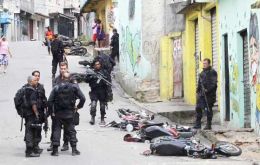
Brazilian police killed more than 11,000 people between 2009 and 2013 with an average of six a day, a public safety group has said. The study by the Sao Paulo-based Brazilian Forum on Public Safety said police nationwide had killed 11,197 people over the past five years, while law enforcement agents in the US had killed 11,090 in the past 30 years.
-
Saturday, May 17th 2014 - 09:03 UTC
Brazilian police tells tourists that if attacked “don't fight, scream or argue”
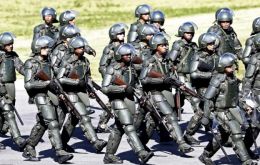
If attacked in Brazil: “Don't fight, scream or argue”. That's the advice being offered to tourists by São Paulo Civil Police ahead of this year's World Cup games which authorities have revealed will be enforced by armored, “RoboCop”-styled riot police.
-
Monday, April 28th 2014 - 07:32 UTC
Brazilian police ‘still have blood on their hands’ 20 years on from massacre

Every year police in Brazil are responsible for around 2,000 deaths, Amnesty International said as it marked the 20th anniversary of the infamous Candelária massacre in Rio de Janeiro. On the night of 23 July 1993, eight young men and women died after a gang of hooded men opened fire on a group of some 50 street children sleeping on the steps of Rio de Janeiro’s Candelária church.
-
Tuesday, February 25th 2014 - 21:00 UTC
Brazilian Federal police on two-day strike for better wages and working conditions

Brazil's federal police started on Tuesday a two-day work stoppage to demand better wages and improved security for the World Cup.
-
Friday, August 31st 2012 - 00:49 UTC
Brazilian federal workers accept proposal and return to work next Monday

Unions representing 90% of Brazil's striking federal public workers have agreed to return to work on Monday, accepting tough terms set by President Dilma Rousseff, who insisted on putting fiscal discipline over the demands of her own political base.
-
Monday, August 13th 2012 - 16:11 UTC
Brazilian federal staff strike extends affecting airports, ports and foreign trade
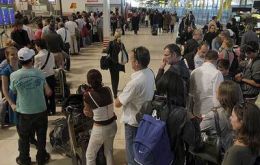
The Brazilian economy is slowing down and civil servants are threatening to intensify the several weeks strike to protest government policy that they allege is appealing to savings in salaries and working conditions to address the situation.
-
Wednesday, August 8th 2012 - 18:36 UTC
Brazilian Federal Police on strike; delays at airports and border crossings
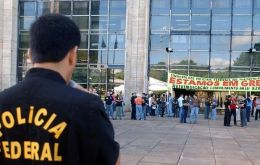
The strike declared by the Brazilian Federal Police on Tuesday is beginning to cause difficulties at international airports, delaying the crossing of visitors to neighbouring countries and some organized pickets have been marching in front of federal government offices.
